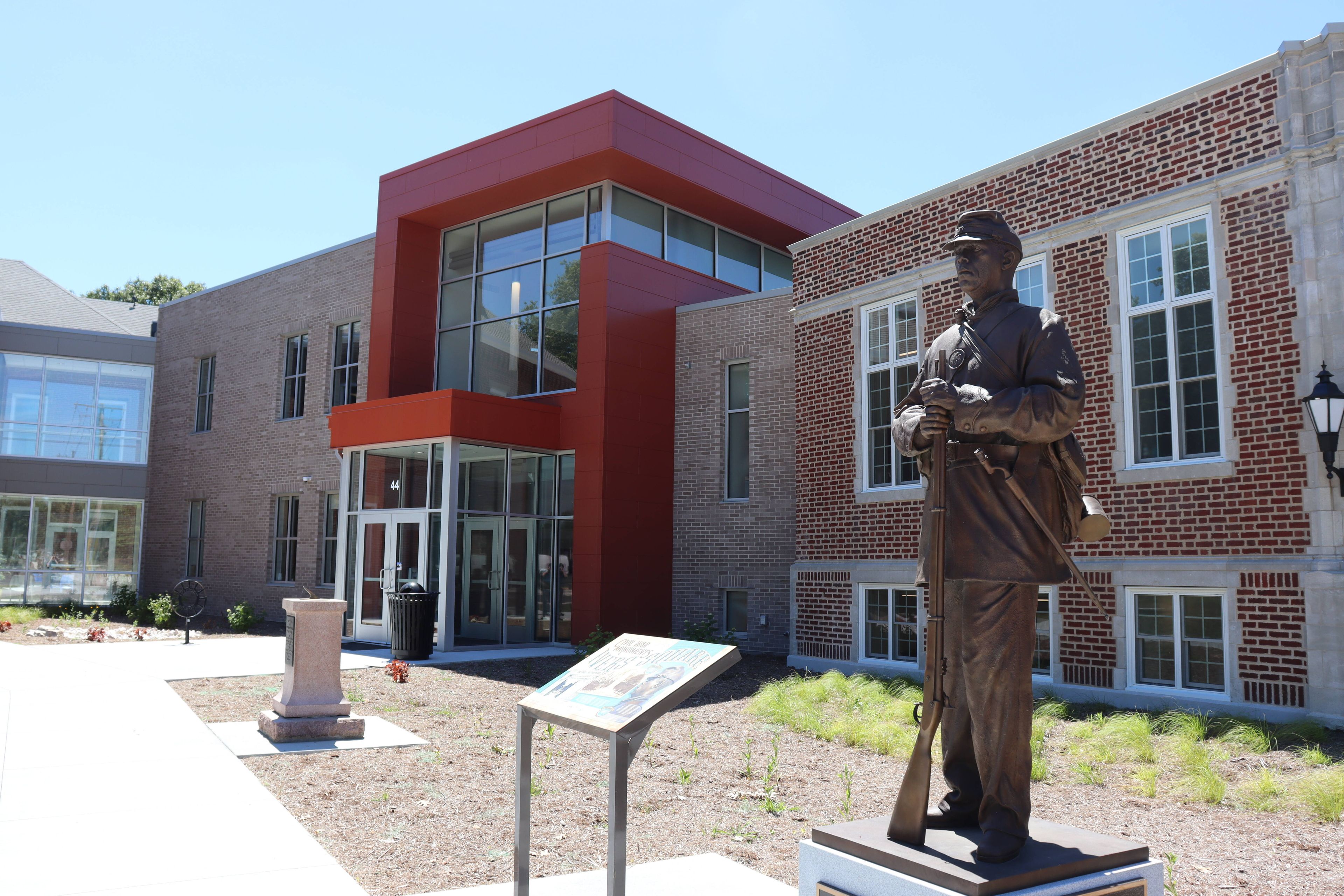Bohnert, Ellis seek GOP nomination for Perry County Coroner
Perry County Coroner race heats up as incumbent William “Bill” Bohnert faces challenger Meghan (Buerck) Ellis in the Aug. 6 Republican primary. Bohnert touts 8 years of experience, while Ellis brings 25 years of military and medical expertise.
Incumbent Perry County Coroner William “Bill” Bohnert looks to serve another term but must first defeat Meghan Buerck Ellis in the Tuesday, Aug. 6 Republican primary.
Bohnert has spent the past eight years serving as Perry County’s coroner, while Ellis, a U.S. Air Force veteran and first responder, seeks her first public office.
The Southeast Missourian sent questionnaires to each candidate running in a contested race in order to inform voters on each candidate’s plans for office ahead of the Aug. 6 primary election. Candidates were asked to answer each question in 100 or fewer words. Any answer significantly longer than 100 words has been edited for brevity. Candidate responses are presented as written by the candidate and have only been edited for spelling and grammatical errors.
What experience do you have that would be relevant as coroner?
Bohnert: I am the current Perry County coroner and have eight actual years of death investigation experience while serving in that position. I am retired after 30 years from the Cape Girardeau Police department where I was involved with many different death cases while being in the patrol division, as a crime scene technician and in the detective division. During that time, I also served for 16 years as an investigator on the Cape Girardeau/ Bollinger County major case squad that investigated homicides and suspicious deaths.
Ellis: I have over 25 years combined military and medical experience as an air traffic controller, respiratory therapist, and first responder with our local EMS agency.
My leadership, medical knowledge, ability to handle stressful and sensitive situations, strong ethical and professional standards, attention to detail and my clear communication skills will be most relevant in the coroner’s position.
I will bring many positive experiences from each one of my professions, along with high expectations, patience and the drive to learn through continued education, to be the coroner Perry County deserves.
What is the most important job/responsibility the coroner has?
Bohnert: In order to give the due diligence that is owed to the deceased and their families, I feel being able to conduct a thorough investigation of each death is the most important job/ responsibility that the coroner has. This includes everything from the on scene investigation, contacting medical providers, getting medical records up to doing toxicology testing and even ordering an autopsy.
Ellis: The most important job of a coroner is to determine the cause of death in cases where it is unclear or suspicious. While determining the cause of death is central to the coroner's role, they also have many other critical responsibilities that contribute to public safety, legal proceedings, and support for families affected by death. I understand the gravity of the coroner’s duty and have put it into three simple terms — to seek truth, to honor the departed, and to provide closure to the grieving.
Do you support a legislative proposal to establish more stringent requirements for county coroners, including that they have basic levels of medical training?
Bohnert: Absolutely! I also support requiring more criminal investigation training. In my opinion, basic medical training is one third of the job and investigative training is two thirds of the job. I say this because if there is a suspicion in the death, an autopsy will be requested and a certified medical examiner or pathologist will do the autopsy. Coroners are not qualified to do autopsies even though many people believe we do. If there is no suspicion in the death, we will speak to the doctors and/or get medical records to determine chronic illnesses, diseases, etc., to sign the death certificate.
Ellis: Ultimately, priority should be to select coroners who possess the necessary skills, knowledge and ethical standards to perform effectively and uphold the integrity of death investigations.
I believe a medical background or relevant expertise is beneficial. An individual with a medical background, has specialized knowledge in anatomy, physiology and pathology, this expertise will aid in accurately determining causes of death, especially in cases involving complex medical conditions. Medical professionals are often held to higher ethical and professional standards in their practice. This will ensure future coroners uphold integrity and impartiality in their investigations, which are critical for maintaining public trust.
How will you ensure the residents of your county can trust you in this position?
Bohnert: I was elected to the Perry County coroners’ office in 2016 after the previous coroner totally violated any trust that people had in the office. I have worked hard to restore that trust to the citizens of Perry County. I took on the role even though there were many problems and issues. I was able to fix these issues and I was able to convince the county commission to increase funding for the office. I know that I have brought professionalism and honesty back to the office and I will continue to do so in the future.
Ellis: I hold myself accountable every single day in my decisions, actions, and behaviors, always making sure to include kindness, respect, and non-judgement. I will continue these same manners and practices in my role as coroner.
I will focus on several key principles and my own personal actions including communication, professionalism, competency, high ethical standards, collaboration, accountability, empathy, and support. All of this will be achieved by clearly explaining the process and procedures, being readily available, responding promptly in respectful attire, always doing what is right even when no one is looking, offering genuine compassion, and providing resources for those involved.
What formal training/education do you have that qualifies you for the position?
Bohnert: I have attended numerous death investigation classes while being on the major case squad. The most extensive ones were put on by the St. Louis Medical Examiners’ office, directed by Medical Examiner Mary Case. The other class I attended was the National Homicide seminar held in Kansas City which was hosted by the Missouri State Highway Patrol. I have also continued my yearly coroners training requirement by the state since 2016.
Ellis: I have an Associate’s Degree of Medical/Health Science, in Respiratory Therapy. National Board Certified RT. I maintain current BLS, ACLS, PALS, and NRP certifications.
I am Nationally Registered and maintain a current National EMS Certification and state EMT license.
Since deciding to run for office, I’m currently taking an online scene investigation course and recently obtained a CIT certification by completing 40 hours of Crisis Intervention Team training, learning how to assist and help individuals in a crisis. I am committed to doing the extra work to become knowledgeable in every aspect needed to fulfill the responsibilities of the coroner.
What would your budget priorities be as coroner?
Bohnert: My top concern budget wise would be to increase the funding for a deputy coroner. Currently a deputy coroner in the state of Missouri for a 3rd class county only has to be paid one thousand dollars a year. They can be paid more if the county commission so determines. In Perry County, we have budgeted five thousand dollars a year for a deputy coroner. As you can imagine, it can be tough to fill that spot with a qualified person who would be on call 24/7/365 and has to undergo numerous training requirements along with the deputy coroner duties.
Ellis: My priorities will focus on effective and efficient operations including personnel, training, forensic services, safety, security, and community outreach.
By having adequate trained personnel, resources to seek assistance from other professional entities, the required PPE for scene processing, secure safe keeping of evidence and the information needed to help grieving families we will ensure a successful and well budgeted office.
One aspect that could ultimately save money is if we are able to decrease preventable deaths. This could be achieved by assisting our local outreach programs, task force office and youth programs throughout the community to help speak about prevention.
Connect with the Southeast Missourian Newsroom:
For corrections to this story or other insights for the editor, click here. To submit a letter to the editor, click here. To learn about the Southeast Missourian’s AI Policy, click here.













